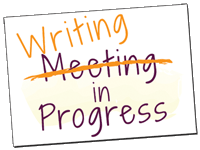
I encourage you to make writing a priority and block time so that writing becomes a regular practice, rather than something you only do when you have specific deadlines.
Although I recognise that different people will work better in different places, I strongly advocate for the legitimacy of writing in your office during normal working hours. Writing is part of your job. You may choose to work from home, in a café, or in the library, but if it is impossible to work in your office it is not really a choice. Protecting the boundaries you’ve created and your right to do the work in the place you’ve chosen can be quite hard work.
What do you do if someone interrupts you? Even though it is annoying, you need to train people to respect your writing time.
Do not cede your attention.
There are 2 parts to an interruption. First, the interrupter tries to get your attention. Second, you give them your attention. You can’t control what other people do, but you can control the second part of the interaction.
When someone interrupts you while writing it is tempting to think “Well, I’ve broken my focus now so I might as well deal with this.” Don’t.
If you deal with the person who interrupted you, you have just rewarded them for interrupting you. They will now have less respect for your writing time.
If you have a Do Not Disturb sign on your door, ignore all knocking.
If someone ignores your sign and walks right into your office, do not look up, turn your chair around to face them, or otherwise give them the impression that they deserve your attention. Tell them that you are busy and not available to deal with their issue right now. (A Twitter follower said this would also work in open plan office space.)
If necessary say “Come back at [specified time]” or “I will come to your office when I’m done. That’ll be [specify how long]” or “Email me with the details” or “Email me to arrange a meeting.” Then keep writing and ignore them. If they keep standing there say, “Please close the door on your way out.” Keep writing and ignore them.
You may have a gremlin who thinks you are being rude. You are. So is the person who interrupted you. You do not owe politeness to rude people.
If you are writing at home and the problem is your spouse, roommate, children, the same basic principles apply. Children understand “is someone bleeding?” from quite a young age. Also “Go bother [other parent or carer]“.
Your child may prefer the way you do it than their other parent/carer, or they’d rather have you do it (now) than do it themselves or wait. You love your kids. You are flattered that they want you to do whatever it is (including apply a plaster to a minor bleeding issue). Their other parent/carer may deal with their issue differently, but the other way is absolutely fine. Stay strong. Your kids will benefit from having more than one adult who can deal with things and from learning to do things for themselves or be patient.
Respect goes both ways.
It is also part of your work to discuss whatever it is your colleague wants to discuss, to meet with students outside of scheduled class time, and so on. It is part of your relationship as a parent, partner, roommate or whatever to deal with whatever it is someone in your home is trying to interrupt you about.
You must follow through. They need to trust that you are not brushing them off, but rather protecting some time for deep focused work. If you say you’ll come find them when you are done, go find them when you are done. If you ask them to email you with details and/or to set up a meeting, respond to the email. If the only way for someone (colleague, student, child, etc) to get you to respond to their request is to persistently interrupt you, that’s what they are going to do. If you are dealing with a child, don’t make them wait longer than is developmentally appropriate.
This shouldn’t have to be said, but you should also respect their focused time and not interrupt them. Don’t play hierarchy games with this. Don’t put yourself in a position where you have to explain why it’s not okay for someone else to interrupt you but it is okay to interrupt them. Especially if your answer is going to be some variation on “because I am more important than you”. And yes, seriously consider your actions towards your children, especially if they are young.
Make it easier for them not to interrupt.
Some of the interrupters have legitimate reasons to communicate with you. Be as clear as possible about when you are available as well as when you are not.
Make sure the times you are available to see students outside scheduled classes are easily available, preferably regular, and students know how to use them. Do they need to book? Can they just turn up? Does everyone understand what “office hours” means or do you need to rename them to make it clear?
If you use a Do Not Disturb or Writing in Progress sign, build trust that it means something. Take it down when you are not writing. Add a sticky note with a time period on it when you are. If someone comes to your office and see’s “Do Not Disturb 10:00 to 12:00” they can come back at noon. (There’s a link at the bottom of this post to download a sign to print!)
Make sure you spend quality time with your kids, partner, friends, and have occasions for people you share living space with to discuss collective issues about the living space.
If you write in the library, you probably don’t want to write in the area where the books for your subject are shelved. You aren’t there to consult books. You are there to write. If you are a historian writing in the engineering section the chances that someone who knows you will pass by and interrupt you are greatly reduced. If you also need to consult books, journals, or other reference materials, you can bring them from one part of the library to another. Look for a place in the library that feels nice to write in. Bring Writing in Progress sign to put on the desk.
Similarly, if you like to write in cafes or other public places, avoid the one you know your colleagues and students frequent. Bring a sign. Wear headphones (even if you don’t listen to anything).
Create a supportive culture for writing.
Assume the best of people. Most people will respect your closed door, sign, polite request to come back later, etc. Don’t treat everyone as if they are a selfish bastard who is on some kind of power trip (even if you have that one colleague who deserves that description).
Respect your colleagues’ writing time and writing practices. Do not participate in “jokes”—about colleagues who work from home, come in late, keep their doors closed when they are in their offices—or in “common sense”—about the impossibility of writing in the office, during normal working hours, or during teaching terms.
People vary. What works for your colleague may not work for you but it is worthy of respect.
Defend practices that help all of you do focused work in your offices during working hours. Challenge “jokes” and “common sense” like those listed in the previous paragraph. If students complain to you that a colleague isn’t available, ask if this is their scheduled office hour, suggest they come back at that time, ask how the colleague has suggested they book appointments outside of office hours, remind the student that you all have other work to do that requires focused time including preparing lectures and seminars, marking student work, and doing research and writing. Argue against having an open door policy in your department and encourage your colleagues to close their office doors unless it is their scheduled office hour. Stand up to colleagues who don’t respect other colleagues’ time, especially if they respect you more (even if the reason they respect you more is unreasonable).
Related posts:
Juggling 101: Elements of a good plan for more on using priorities and boundaries to ensure you get to what’s important
Introducing That Selfish Bastard because the biggest barrier to you doing what I suggest here is not wanting to be rude or selfish.
Who values your time? by Grace Judson addresses other ways that disrespectful colleagues steal your time and other ways to create boundaries
Download and print a sign for your door

A4 size 15 Min Challenge - A4 (6283 downloads )
US letter size (8.5″ x 11″) 15 Min Challenge - US Letter (5574 downloads )

Would you like a mug with the Writing in Progress sign on it? You can buy one from Zazzle, which is one of those online companies with stores and warehouses in different places. They are print on demand products. Go to Zazzle.com and then pick your country from the drop down in the top right (or guess at the ending based on your country: Zazzle.ca, Zazzle.co.uk, Zazzle.de etc) Then copy and paste this at the end of the URL
/a_meeting_with_your_writing_mug-168801886009446041
Check and make sure you don’t have too many / before it. Hit return and you should be on the appropriate page for the mug.
They have sales all the time so check right above the image for some text with a discount code.
This post started as a Twitter thread on 11 September 2019, and was then turned into a newsletter for the Academic Writing Studio newsletter list on 13 September 2019. Updated to add related posts 3 February 2020. Added to Saying No Spotlight, March 2022.








